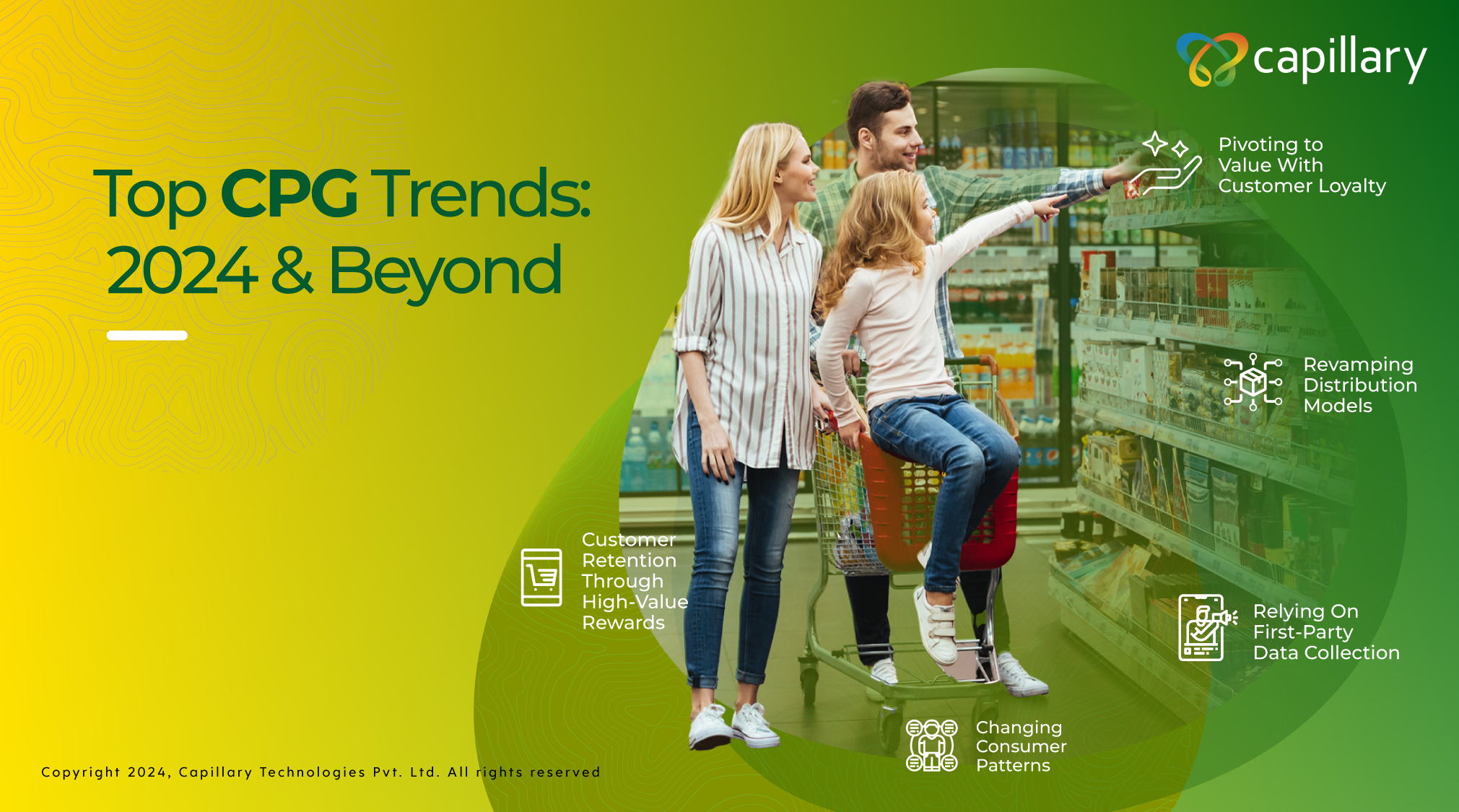- Design industry shaping loyalty programs
- Integrate easily and go live quicker
- Deliver hyper-personalized consumer experiences
Blue Rewards from Al Futtaim Group Shares Loyalty Success Stories and Evolution. Watch Podcast >
Capillary Triumphs with 4 Prestigious Wins at the 2025 International Loyalty Awards! Read more >

The CPG (consumer packaged goods) landscape is undergoing a major change post-pandemic with the entire D2C wave coming up and a major rise in online commerce. Led by the likes of Unilever, P&G and Nestle, CPG brands across the globe have been doubling efforts to build a direct relationship with the end consumer and this can be enabled through a loyalty program.
It has become critical for CPG brands to get a 360-degree scope of the end consumer or their retailers (incase of a B2B loyalty program), have zero-party data on a sophisticated CDP, and then personalize communication for their customers. There are several more CPG trends owing to which more and more brands are focusing on loyalty tactics and in this blog, we look at some of the key trends to watch out for 2025.
While the shift towards online purchases remains a dominant trend, there is a new emphasis on customer retention in the face of post-pandemic inflation. Brands are recognizing the importance of retaining their customer base by offering high-value rewards through robust customer loyalty programs.
As the cost of living and products continue to rise, consumers are becoming more discerning about where they allocate their disposable income. CPG companies are realizing that the key to success lies in providing tangible incentives that genuinely engage and retain their customer base. Loyalty programs that offer real value will emerge as the winners in this competitive environment.
Another CPG trend post the COVID-19 pandemic witnessed many consumers switching their brand loyalties to newer brands. It also saw consumers innovating with newer and never-tried-before products in the CPG category. All this builds a huge testament to the fact that dynamic consumer behavior is here to stay and brands must act accordingly.
While the millennial generation is growing steadily, in some parts of the world – the average consumer is aging faster. CPG brands thus need to keep a steady balance to cater to the different groups seamlessly. Building unique products and services might not be the only answer but offering personalized services for different consumer segments can ensure an everlasting consumer-brand relationship. This is where customer loyalty programs would become a great resource for brands to stay connected in the entire customer shopping journey.
Another CPG trend that brands need to focus on is the enablement of faster delivery of products more than ever before whether through e-commerce platforms or other newer delivery formats like at-home, BOPIS (buy-online-pick-up-in-store), and curbside delivery. Convenience has gained more prominence when selecting a product. A recent study by Deloitte highlights that more than 50% of consumers are spending more on convenience to fetch a specific product than the product itself. Omnichannel is no longer the new norm that CPG brands will follow, it is all set to become a default in CPG marketing strategy. This will largely have brands communicating to both the channels – Direct To Retailer and Direct To Consumer.
With a rise in online purchases for consumer packaged goods, more and more CPG companies will turn to zero and first-party data collection. They will be gathering data directly from their customers and this will soon be an important CPG trend for the space.
Having access to this critical data enables brands to truly know and understand their customers better than ever before. With this data, they can offer special offers, personalized communications, and unique experiences that big-box stores can’t match.
Zero and first-party data help CPG companies customize their products and marketing to individual customers. They can offer personalized discounts and suggest other products that their consumers might purchase based on previous transactions and engagement history. This will improve their customer loyalty and drive increased sales for the business.
While the volatility experienced by CPG brands across both the demand and supply sides will continue, brands must focus on carving a niche for themselves in this highly competitive market. Price is no longer the only decision-making factor, other factors like building experience, convenience, and connectedness have forayed in this industry. The shift from a conventional distribution model to a more value-focused model will be the next big thing.
Besides streamlining order management and inventory capabilities, CPG brands need to invest in procuring zero-party data to get started in this digitized revolution. By connecting with consumers through loyalty programs powered by a robust AI intelligence platform, brands can communicate with consumers at the right time and on the right channel. Brands must aim to drive greater enterprise agility with superior marketing capabilities.
A crowded industry like CPG needs to implement changes now to witness the results in the near future. Knowing that a cookie-less world is just around the corner and data is the answer to consumers’ wavering attention span, CPG brands need to invest in a real-time marketing strategy leveraging CPG trends that would encapsulate consumer buying behavior accurately.
At Capillary, several teams collaborate to create revolutionary Loyalty Solutions that can withstand challenging times and generate results for your enterprise. Chat with our Loyalty Experts today to unlock the journey of a successful CPG loyalty program.

October 24, 2024 | 4 Min Read
CPG Trends have become critical for brands to get a 360 degr